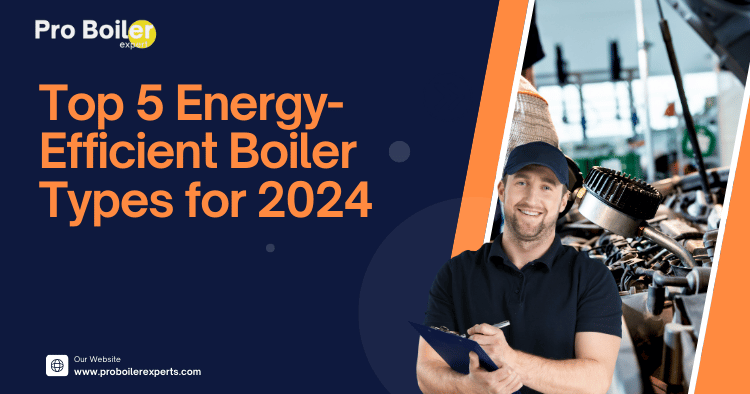Table of Contents
- Introduction
- 1. Condensing Boilers
- 2. Combi Boilers
- 3. Biomass Boilers
- 4. Electric Boilers
- 5. Steam Boilers
- Conclusion
- FAQs
Introduction
As we move into 2024, energy efficiency remains a pressing concern, particularly regarding home heating systems. With escalating energy prices and increased awareness of environmental impacts, selecting an energy-efficient boiler has never been more critical. This article explores the top five energy-efficient boiler types available in 2024, each offering distinct advantages to meet diverse household needs.
1. Condensing Boilers
Condensing boilers are the pinnacle of energy efficiency, recognized for utilizing exhaust gases that would typically be wasted. They can achieve efficiency ratings of up to 98%.
How They Work
These boilers capture and reuse heat from flue gases. The heat exchanger cools the gases to the point of condensation, extracting additional heat before it is released into the atmosphere.
Benefits
- High Efficiency: Efficiency ratings often exceed 90%, resulting in substantial energy bill reductions.
- Environmentally Friendly: They produce lower emissions, contributing to a reduced carbon footprint.
- Space-Saving Design: Many condensing models are compact and can fit easily in smaller spaces.
Considerations
- Installation Costs: Although they may have higher initial costs, the long-term savings frequently justify the investment.
- Maintenance Needs: Regular upkeep is essential to ensure optimal performance.
For more detailed insights into condensing boilers, check out our article on Top 5 Benefits of Condensing Boilers You Should Know.
2. Combi Boilers
Combination boilers, or combi boilers, serve as all-in-one solutions that provide both heating and hot water on demand.
How They Work
Combi boilers heat water directly from the mains supply, eliminating the need for a separate hot water cylinder. This on-demand heating makes them highly efficient.
Benefits
- Space-Saving: Their compact design eliminates the need for bulky tanks.
- Instant Hot Water: You can enjoy hot water whenever you need it, without waiting.
- Lower Energy Costs: Reduced energy waste translates to savings on utility bills.
Considerations
- Water Pressure Limitations: Using multiple outlets simultaneously may impact water pressure.
- Proper Sizing: Correct sizing is crucial to meet your household’s demands.
For a deeper dive into the advantages and considerations of combi boilers, refer to Combination vs. System Boilers: Pros, Cons & Key Differences.
3. Biomass Boilers
Biomass boilers use organic materials, such as wood pellets or chips, as fuel. This renewable energy source is becoming increasingly popular due to its sustainability.
How They Work
Biomass boilers burn organic materials to generate heat, which can be used for space heating or hot water production. They emit significantly lower levels of CO2 compared to fossil fuels.
Benefits
- Renewable Energy Source: Biomass contributes to a sustainable environment.
- Lower Fuel Costs: Depending on local availability, biomass can be more affordable than traditional fuels.
- Government Incentives: Many governments provide incentives for using renewable energy sources, enhancing financial viability.
Considerations
- Storage Space: Adequate storage for biomass fuel is necessary, which may be a challenge in smaller homes.
- Regular Maintenance: More frequent maintenance may be required compared to other boiler types.
Explore the benefits of biomass systems further in our article on Top 5 Benefits of Biomass Boilers for Eco-Friendly Heating.
4. Electric Boilers
Electric boilers are an excellent option for homes without gas supply, converting electrical energy into heat.
How They Work
Electric boilers utilize electric heating elements to heat water, offering a straightforward and effective heating solution.
Benefits
- No Emissions: They produce no emissions at the point of use, making them environmentally friendly.
- Easy Installation: Generally simpler and cheaper to install than gas boilers.
- Quiet Operation: They operate quietly, ensuring a peaceful home environment.
Considerations
- Higher Running Costs: Electricity might be more expensive than gas, leading to higher operating costs.
- Limited Heating Capacity: They may not be ideal for larger properties requiring extensive heating.
For more information on electric boilers, see Top 5 Electric Boilers for Efficient Home Heating 2024.
5. Steam Boilers
Steam boilers are efficient systems that generate steam for heating and other applications, particularly in larger buildings.
How They Work
These boilers heat water to create steam, which is distributed through pipes to radiators or other heating elements.
Benefits
- High Efficiency: Modern steam boilers can achieve high efficiency, especially when integrated with condensing technology.
- Durability: Known for their longevity, steam boilers can serve for many years with proper maintenance.
- Versatility: Ideal for various applications, including industrial processes.
Considerations
- Complex Installation: They often require more complex installation and maintenance.
- Space Requirements: Steam boilers are generally larger and require more installation space.
To learn more about steam boilers, check out our guide on Top 5 Commercial Boilers: Efficiency & Performance Guide.
Conclusion
Selecting the right energy-efficient boiler for your home in 2024 can lead to significant savings and a lower environmental impact. From condensing and combi boilers to biomass, electric, and steam options, there is a suitable choice for every need and budget. Be sure to consider your specific requirements, including space, fuel availability, and heating demands, before making a decision.
For additional information on energy-efficient heating solutions, explore resources from the U.S. Department of Energy or the Energy Saving Trust.
FAQs
Q: What is the most energy-efficient boiler type?
A: Condensing boilers generally offer the highest efficiency ratings, often exceeding 90%.
Q: How can I maintain my boiler’s efficiency?
A: Regular servicing, cleaning, and ensuring proper insulation for pipes can help maintain efficiency.
Q: Are electric boilers cheaper to run than gas boilers?
A: Not necessarily. While they may have lower installation costs, electric boilers often have higher running costs depending on local electricity rates.
Q: Can I switch from a gas to a biomass boiler?
A: Yes, switching is possible, but it may require modifications, including fuel storage and system adjustments.
If you have more questions or need personalized advice, feel free to reach out!





